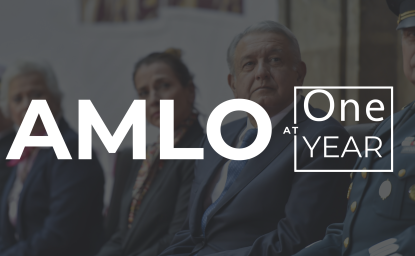Children's parties in Mexico are usually celebrated with a piñata that the blinfolded children hit with a stick. That's where the expression blind hits comes from. Because they are disoriented by the lack of vision, children turn around looking for the object they must hit until the sweets contained in it burst out. Hence the expression. This one applies in other contexts. In public policy, for example, blind hits are said to occur when initiatives are launched without fully understanding the public problem to be solved. And making use of this allegorical resource, I would say that, in terms of security, we have been blind hitting for years. And it does not look like it is going to be any different with the new administration.
During López Obrador’s first year in office, many things have happened in the field of security. In this period, the president has made momentous decisions with profound implications for the country, but with poor chances of delivering results. Two facts are most relevant: the creation of the National Guard and the disappearance of the Federal Police. In my opinion, these two decisions are blind hits because there has been no thorough argument that is able to explain them, nor evidence to support them.
We actually have a deficit of understanding regarding what is going on in the country. We talk about violence, when there are many manifestations of violence. We talk about organized crime, when there are different groups and dynamics. The phenomenon of violence is not one, there are many. Each region, state, municipality, community, has its own peculiarities. But we make high calibre decisions as if we had indisputable certainties.
What we do know about is the weakness of our security and justice institutions. Because the diagnosis of these weaknesses has been worked better than the diagnosis of the violence dynamics that we have in the country. What remains suprising is the fact that we have not done anything about it.
I do not know if President López Obrador is aware of this data -- not his data--. Information generated by the government itself, the Executive Secretariat of the National Security System (SESNSP), exposes realities that explain why we have not been able to win the fight against crime. I will offer pieces of evidence on the conditions kept by state polices in the country. Information regarding the municipal police is still lacking since we do not have any, probably due to the fact that they are weaker and devoid of the basics. But in any conversation about regaining peace and security, this should be the starting point.
The information comes from the diagnosis SESNSP made on the state police in 2019 using a methodology that has been applied for some years now. This methodology measures different dimensions of the capabilities of the security bodies and applies some standards. Our breakthroughs are very slow and our lags can only be explained as a result of great carelessness.
To start with, the police in the states in Mexico is much less than it should be. It is difficult to set a standard in terms of the optimal size of police bodies, but there are some parameters. The average number of countries belonging to the UN is 2.8 police men per 100 thousand inhabitants; in Mexico the number is 0.98 per 100 thousand. It is evident that we do not have the number of elements that could be considered sufficient. Besides being few, they are poorly trained. Nearly half of the elements has no positive evaluation in core competencies. 11 percent do not even have basic education. Additionally, they train in academies that are not equiped with what they need, including a shooting stand.
I cannot comprehend a security model without cops suited to do their job. Without cops who address proximity, understand their environment and build bonds of trust with the community. Without doubt, I opt, for a security model that is based on a local approach.
The president does not make an evidence-based decision. The president obeys his obsessions. But is not aware that by doing so, he replicates the model of his predecessors: a centralist one who discredits the local. One who favors the military over the civilian. One that does not strengthen the capabilities of the Mexican State in this aspect.
What can I say about AMLO's first year of government in terms of security? That he ressembles his predecessors. With the aggravation that he chose to destroy value by dismantling the federal police.
What do I forsee if there are no changes? That at the end of his term we will continue with a security crisis, with a capacity deficit as described and with a lack of understanding about what is happening in the country. Another six years lost, then.
I would like to see a shift in the president's strategy in which he listens to those on his team who are promoting a police model that favors the local approach.
I'd like for the president to stop giving blind hits.
The opinions expressed in this article are solely those of the author.
Author


Mexico Institute
The Mexico Institute seeks to improve understanding, communication, and cooperation between Mexico and the United States by promoting original research, encouraging public discussion, and proposing policy options for enhancing the bilateral relationship. A binational Advisory Board, chaired by Luis Téllez and Earl Anthony Wayne, oversees the work of the Mexico Institute. Read more

Explore More
Browse Insights & Analysis
AMLO at One Year

The OSCE is a Good Value for America


